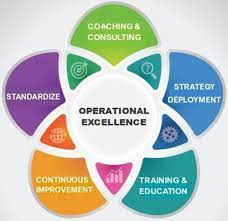

Operational excellence is not a one-size-fits-all approach; it encompasses a set of core principles and methodologies that form the foundation for a high-performing organization. This blog post talks about the main parts of operations excellence, giving advice on how businesses can build a strong base to always get better and grow in a good way.
In today’s energetic and competitive business environment, organizations are constantly seeking ways to enhance their efficiency, productivity, and overall performance. Operational excellence (OpEx) has emerged as a strategic imperative, enabling businesses to achieve sustainable growth and success by optimizing processes, eliminating waste, and fostering a culture of continuous improvement.
At the heart of operational excellence lie two fundamental pillars:
-
Strategy Operation: Making sure that all work aligns with the organization’s strategic goals, and it is important to achieve the desired results. This involves breaking down big goals into smaller, measurable targets, spreading them across the organization, and giving the needed help to reach them.
-
Performance Management: Establishing a robust performance management system is crucial for tracking progress, identifying areas for improvement, and making data-driven decisions. This involves setting clear goals, collecting, and analyzing data, giving regular feedback, and rewarding people when they do a good job.

Robust Performance Management System

Here’s a breakdown of what a robust performance management system looks like:
-
Set clear goals that everyone understands.
-
Track your progress and collect data.
-
Give regular feedback and help people improve.
-
Recognize and reward people for their good work.
By following these steps, you can create a performance management system that helps your organization reach its full potential.
-
High-Performance Work Teams: Empowering teams to operate effectively and efficiently is essential for driving operational excellence. This involves fostering a collaborative and supportive work environment, providing training and development opportunities, and encouraging employee involvement in problem-solving and innovation.
-
Process Excellence: Continuously improving and optimizing processes are fundamental to achieving operational excellence. This involves identifying and eliminating non-value-adding activities, standardizing processes, implementing lean principles and methodologies, and leveraging technology to automate and streamline workflows.
At the heart of operational excellence lie four fundamental pillars:
Effective strategy deployment is the cornerstone of operational excellence. It ensures that every employee understands the organization’s strategic goals and how their individual contributions align with achieving those goals. This alignment creates a sense of purpose and direction, fostering a culture of ownership and accountability.
The strategy deployment process typically involves:
-
Establishing Clear Goals: Defining clear, measurable, and achievable goals that cascade from the organization’s overall strategic vision.
-
Communicating Goals: Effectively communicating the goals to all employees, ensuring everyone understands their role in achieving them.
-
Aligning Resources: Allocating the necessary resources, including people, time, and budget, to support the achievement of strategic goals.
-
Monitoring Progress: Regularly tracking progress, identifying roadblocks, and adjusting as needed.
-
Celebrating Successes: Recognizing and celebrating achievements to maintain motivation and engagement.
Performance Management: Measuring Success and Driving Improvement
Performance management is the systematic process of setting, measuring, and managing performance to achieve organizational goals. It provides a framework for evaluating individual and team contributions, identifying areas for improvement, and making data-driven decisions.
A robust performance management system should include:
-
Clearly Defined Objectives: Establishing clear and measurable objectives for individuals and teams, aligned with the organization’s strategic goals.
-
Regular Performance Reviews: Conducting regular performance reviews to provide feedback, identify strengths and weaknesses, and set development goals.
-
Data-Driven Evaluation: Utilizing data and analytics to measure performance objectively and identify trends.
-
Coaching and Development: Providing coaching and development opportunities to help employees improve their skills and performance.
-
Performance-Based Rewards: Recognizing and rewarding high performance to motivate and retain top talent.

High-Performance Work Teams: Empowering High-Performance Teams to Drive Innovation and Growth
High-performance work teams are the driving force behind operational excellence. They attach the collective knowledge, skills, and experience of team members to achieve exceptional results.

Creating high-performance work teams requires:
1. Clear Team Goals: Establishing clear and shared goals that align with the organization’s strategic objectives.
2. Empowered Team Members: Empowering team members to make decisions, solve problems, and contribute their ideas.
3. Effective Communication: Fostering open and transparent communication among team members.
4. Diverse Perspectives: Encouraging diversity of thought and perspectives to enhance problem-solving and innovation.
5. Continuous Improvement: Promoting a culture of continuous learning and improvement, where team members actively seek ways to enhance their performance.
Process Excellence: Streamlining Operations for Efficiency
Process excellence is the systematic approach to identifying, designing, implementing, and continuously improving processes to achieve optimal performance. It involves eliminating non-value-adding activities, reducing waste, and standardizing processes to ensure consistency and efficiency.

Key elements of process excellence include:
-
Process Mapping: Creating detailed process maps to visualize and understand the flow of work. By mapping out each step of a process, organizations can identify areas for improvement, eliminate unnecessary steps, and streamline workflows.
-
Waste Identification: Identifying non-value-adding activities, bottlenecks, and inefficiencies. Waste can be any activity that does not contribute to the desired outcome of a process. By identifying and eliminating waste, organizations can reduce costs, improve efficiency, and enhance customer satisfaction.
-
Process Redesign: Redesigning processes to eliminate waste, improve efficiency, and enhance customer satisfaction. This may involve implementing lean principles, such as just-in-time (JIT) manufacturing, to reduce inventory and optimize resource utilization.
-
Standardization: Standardizing processes to ensure consistency and quality. By standardizing procedures, organizations can reduce variability, minimize errors, and improve overall process performance.
-
Continuous Improvement: Fostering a culture of continuous improvement, where employees are encouraged to identify and implement process improvements. This involves establishing a feedback loop, tracking progress, and celebrating successes.
By implementing these key elements of process excellence, organizations can streamline operations, reduce costs, improve efficiency, and enhance customer satisfaction. This continuous pursuit of improvement is essential for achieving operational excellence and sustainable success in today’s competitive business environment.
Conclusion: Embracing Operational Excellence for Organizational Success
Operational excellence is not a destination but an ongoing journey of continuous improvement and adaptation. It requires a commitment from leadership, a culture of collaboration, and a willingness to embrace change. By embracing the four pillars of operational excellence – strategy deployment, performance management, high-performance work teams, and process excellence – organizations can create a foundation for sustainable success and achieve their strategic goals.
Businesses that want to streamline their operations, optimize their processes, and boost their profits should consider seeking help from an Operational Excellence Consultancy – D&V business consulting. Our expertise lies in identifying and eliminating inefficiencies, increasing efficiency, and enhancing overall productivity. We are the leading Operational Excellence Consulting Firm in Ahmedabad and provide a comprehensive strategy to improve quality, enhance customer satisfaction, and foster a culture of continuous improvement.

Manufacturing Excellence Consultants specialize in optimizing operational procedures and driving productivity. They draw upon their experience to identify best practices, pinpoint areas for improvement, and streamline processes. By focusing on boosting productivity and reducing costs, D&V business consulting help businesses achieve manufacturing excellence and maintain their competitive edge in the market.
D&V Business Consulting is a leading business consulting firm that specializes in helping organizations to achieve operational excellence. They are understanding of the latest operational excellence methodologies and tools, and they have a proven track record of helping organizations achieve significant improvements in efficiency, productivity, and quality. With the support of D&V Business Consulting Company can achieve operational excellence by streamlining workflows, improving productivity, and reducing operational costs. DVBC has a lot of experience and knowledge and provide customized solutions that match the specific needs of each client.
D&V Business Consulting has a proven track record of helping organizations achieve significant improvements in operational performance. For example, the firm helped one client reduce its production costs by 20% and another client improve its customer satisfaction rating by 15%.
D&V Business Consulting firm is committed to helping organizations achieve operational excellence. The firm’s consultants are experts in their field, and they are passionate about helping organizations succeed.
If you are looking for a partner to help you achieve operational excellence, D&V Business Consulting company is a great option. The firm’s consultants are experts in their field, and they are passionate about helping organizations succeed.
 Why Us?
Why Us?  Resources
Resources  Support
Support 











